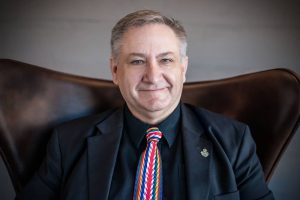VDQ-NRG Systems Pitches Sooke On $50M Waste-To-Power Processing Plant

VDQ-NRG Systems Inc. Vice President of Strategy James Kernaghan
SOOKE – Garbage is power.
It is to VDQ-NRG Systems Inc., a prairie company with offices in Saskatoon and Calgary that had Vice President of Strategy James Kernaghan, make a presentation to Sooke council about what their system could do for the area. VDQ-NRG would like to build a system in Sooke that would take 100 per cent of plastic waste and 100 per cent of organics and turn it into clean energy – an investment that would cost in the neighborhood of $55 million.
VDQ-NRG has made proposals to larger cities and hasn’t yet been able to land a contract to build their facility, but Sooke heard about it and asked if they would make a presentation to council.
A clean-tech company founded by President Peter Voldeng, VDQ-NRG repurposes landfill waste into alternative energy sources and useable byproducts.
Although their model can be scaled to service a town of 30,000 people, their “model city” would have a population of about 150,000 people that produces 100,000 tons of waste per year. From this, the company states the city will receive over $5 million in annual revenue, while creating over 50 direct jobs. They claim it will reduce greenhouse gas by over 100,000 tons – the equivalent of taking 25,000 cars off the road.
The company’s website states that their waste reprocessing facility “processes up to 90 per cent of landfill waste into energy and industrial materials by using thermo-chemical technology.”
VDQ-NRG’s partnership with communities to build waste reprocessing facilities includes a shared revenue model that increases the financial viability of the projects, with both the market partner and VDQ-NRG receiving revenue from the completed facility.
They do this by creating a strategic marketing and partnership plan that uses technology to convert problems into beneficial solutions. Besides new revenue sources for cities, the benefits include reduced landfill-associated costs and increasing the lifespan of the landfill, streamlined waste collection and more effective recycling, all while processing waste locally as opposed to exporting it to landfills elsewhere. The company also claims the operation would become eligible for government grants related to green technology.
The company’s website states: “Current waste management programs to reduce and recycle waste have seen limited success. Blue bin programs give people a sense of environmental responsibility without solving the problem. Any waste that cannot be effectively recycled ends up in a landfill.”
Utilizing a thermos-chemical processes, waste is turned into energy with no need to reduce the moisture content of the waste, without incineration, gasification or pyrolysis.
“A VDQ-NRG waste repurposing facility integrates several technologies including Hydrothermal Liquefaction (HTL) and Electro-Depolymerization,” it states. “End products include high-grade distillate, syngas, bio-crude oil, carbon black and other by-products. Water can be reclaimed and utilized as necessary.
“The self-contained and compact design of the facility allows it to be located in areas where traditional waste gathering plants and landfills would not be practical or welcomed,” it explains. “Household waste is picked up at the door using a single stream program. Existing city trucks or city approved contractors will collect the waste and transport it to the processing facility. Waste collection is streamlined and the trucks will have less distance to travel.”
Once there, an artificial intelligence automatic customer management system tracks weights coming while minimizing interaction with facility staff, and it provides a complete audit trail for compliance with environmental regulations and streamlines time required for unloading trucks.
“Standard sorting technology will be sourced from companies such as Vecoplan or Machinex. These companies have extensive experience in sorting wastes and recycling around the world,” it continues. “Plastics and organics are separated from high value materials and non-processable materials. Metals, deposit containers, and other materials of value will be sold. Reject materials such as stones, glass and brick will be removed from the system and sent to the landfill for recovery or disposal.”
Sooke council has something to think about.


